School Year of Core Vocabulary Words – Older Student Lessons: AAC Resources for June
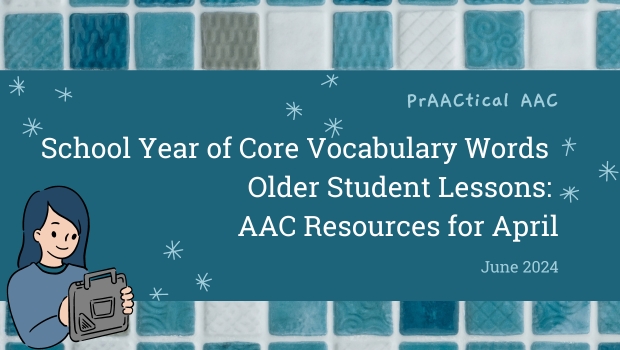
Here in the US, the school year is just about over, but there’s still enough time to welcome back guest authors Michaela Sullivan and Lindsay Dougherty for another set of Older Student Lessons in the School Year of Core Vocabulary Words series. As usual, they share some wonderful resources including two slide decks full of activities and the data collection forms specific to the June core words. They also provide a perspective on the presumption of competence and share their thoughts on its role in AAC.
SCHOOL YEAR OF CORE- Older Student Lessons
Access & Copy below:
INTRODUCTION- JUNE 2024
Welcome back to the School Year of Core – Older Student Lessons: June!
Summer is finally here, and we are celebrating with new core words and themes for the month of June. Engage in core word-centered activities centered around the end of the year, graduation, summer vacation, summer jobs, and national parks. We will also be celebrating holidays, including Juneteenth, the summer solstice, and Pride month. We hope you enjoy the activities and resources with your friends, family, and students.
We would love your honest feedback! Let us know what has been helpful and what could be improved, so our project can continue to grow and change. If you have adapted the SYOC – OSLs to meet your unique needs, please feel free to share! We would love to add your creations to our collection of resources. Email us at schoolyearofcore@gmail.com.
If you are new to the SYOC-OSL’s, please find the links to our slide decks at the top of this post. Make a copy of the slide deck and modify/adapt the lessons to meet your needs.
To further enrich your experience, download the corresponding Symbol Charts containing June Level 1 and Level 2 words. They can be used as hands-on low tech visuals, and tracking sheets to keep your lessons on track.
As always, we have provided over 150 slides of activities for June and it would be almost impossible to complete all of the activities. Our motto is, “take what you want and leave the rest.” Think of this as an activity buffet. Choose lessons to meet your needs, and save the rest for next school year.
Although these resources were created for AAC users, they can be utilized effectively with a variety of learners. Explore our collection with your older students and don’t forget to have fun! We hope you have a wonderful summer!
All Slide Decks contain:
- Icebreaker Activities, (e.g. Jokes, Would You Rather, National days)
- Monthly Language Resources Include:
- “Tell us a Story” slides: to support students to co-construct narratives about past experiences using meaningful photos given WH question scaffolds.
- “Get Off the Computer” suggestions for Shared Reading and Share a Word to Describe your Day: We added a few slides with Shared Reading suggestions and a topic/interest inventory where students/adults can share the topics they are most interested in.
- Self Care: We will review different topics through the lens of self care.
- Student Reflection Time: students can use a visual rating scale to share whether or not they enjoyed an activity.
- Topics: Students will share if they agree or disagree with statements, as well as answer questions related to topics of the month.
- Symbol charts: include icons from a wide array of communication systems.
- Feelings Check-In: Including sentence frames and visuals
- Weekend reflection: Including visual icons and options.
- Music Choices: Listen to music corresponding to themes and core words
- Media: animated shorts and short, educational video clips
- Predictable chart writing
- Reading
- The Strategy of the Month is The Participation Model and Participation Plans.
We hope you enjoy the School Year of Core-Older Student Lessons for JUNE.
Weeks 1-2:
THE WORDS
Level 1 Words: say, think, soon, later, together, understand, proud, favorite
Level 2 Words: near, far, long, short, small, medium
Weeks 3-4:
Level 1 Words: how
Level 2 Words: rest, last, see you later
Level 1 Words
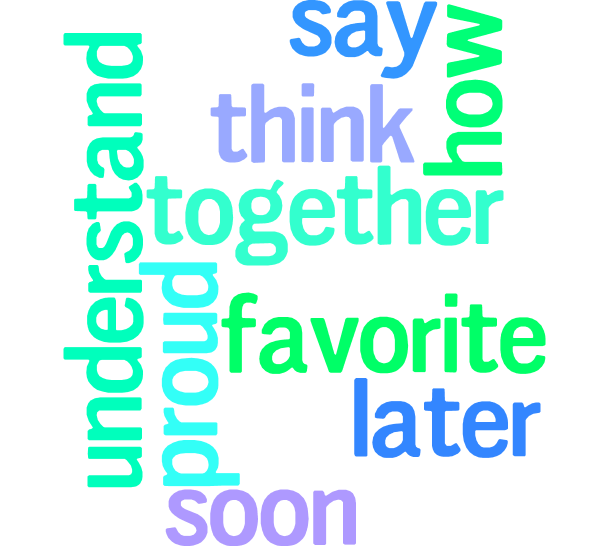
Level 2 Words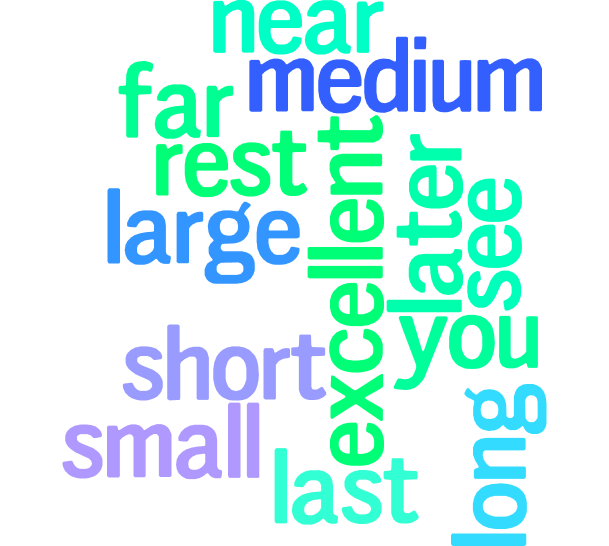
THE SYMBOLS
You can download grids with the symbols for this month’s words from the lists below. These handy visual tools can help us remember what words to focus on and be useful in our intervention and instruction.
Level 1 Words
- Avaz
- CoughDrop
- LAMP Words for Life
- Wordpower 60 Basic
- Unity 45 Sequenced
- Unity 60 Sequenced
- Unity 84 Sequenced
- Blank Grid (add your own symbols)
Level 2 Words
- Avaz
- CoughDrop
- LAMP Words for Life
- Wordpower 60 Basic
- Unity 45 Sequenced
- Unity 60 Sequenced
- Unity 84 Sequenced
- Blank Grid (add your own symbols)
The Google Slide Resources
Strategy of the Month: PRESUMING COMPETENCE
The act and practice of Presuming Competence has been referred to as the least dangerous assumption (Anne Donnellan, 1984), and applying this ‘mindset’ may be highly beneficial when selecting and implementing an AAC system for the individuals with whom we work. As parents, educators, therapists, and others, we all want our students to be able to say, ‘whatever they want, however they want, whenever they want,’ and once a student is exposed to and provided with a robust communication system it can provide them with opportunities to learn and use a rich core and fringe vocabulary to express themselves using a wide array of communication functions. Communication is a human right, and we are in a position to open up their access to words that have power. When we Presume Competence, we believe everyone can learn.
Please find the following additional resources on Presuming Competence below. These resources may be helpful for individual learning and/or for team training.
The Importance of Presuming Competence Ms. Moore shares her ideas about presuming competence in ALL students. According to Ms. Moore, this video targets ‘one of the biggest barriers to inclusive education – mindset. This video will encourage you to reflect on your own assumptions about disability and start to take action to disrupt the ableist structures in education by taking a very important first step…. presuming competence in all students. Courtesy of Five Moore Minutes, by Shelley Moore.
Under the Table – The Importance of Presuming Competence |Courtesy of Shelley Moore | TEDxLangleyED 2016. In this engaging and enlightening TedTalk, Shelley Moore discusses inclusive education and presuming competence at large and goes in depth about how she learned about Presuming Competence from one of her students with Complex Communication Needs. This TEDx Talk is so rich, thought-provoking, and deeply moving and could be utilized for a large or small group to discuss how we have reached our students with great needs.
Shelley Moore has worked in both elementary and secondary schools supporting students with and without special needs in inclusive contexts in Alberta, New York, and British Columbia. She is currently an inclusive consultant in the Richmond School District, as well as various other districts throughout the province. She has presented conferences both nationally and internationally, and is a sessional instructor at Simon Fraser University, University of British Columbia and University Of British Columbia – Okanagan
One of Ms. Moore’s slides in the Ted Talk. (priceless)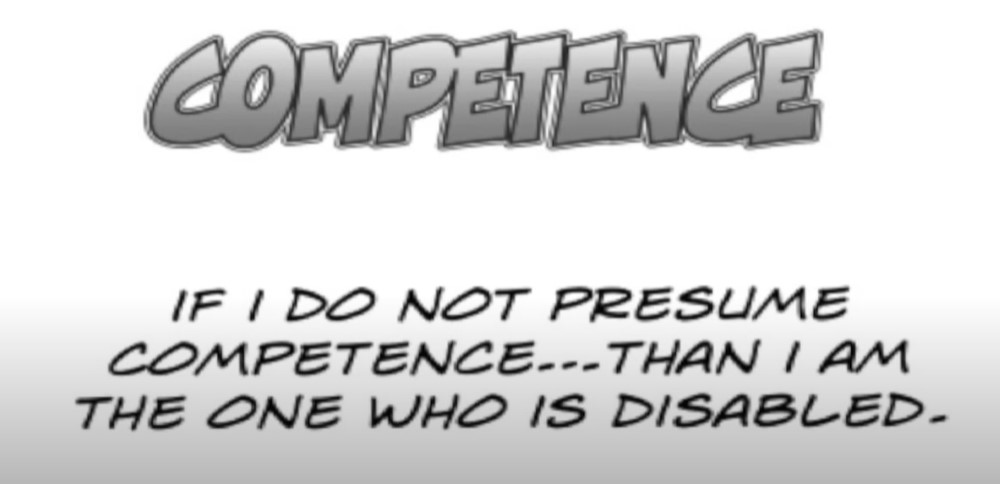
Presuming Competence This video discusses presuming competence of people with disabilities, which competence means believing people are capable and that they do understand you even if they don’t outwardly show you that they do. Courtesy of TheCQL
Presuming Competence in Practice by Heidi LoStracco, M.S. CCC-SLP, January 15, 2017
Presuming competence: the only prerequisite to AAC
Model as a MASTER PAL: Module 9 – Presume Potential
DATA COLLECTION & ACCOUNTABILITY FORMS
Taking data to measure performance and keeping track of our own modeling behavior are two things we can do to strengthen our AAC teaching. Here are some forms that you can use to support those efforts.
This posting is dedicated to all of the amazing Educators, SLP’s, parents and therapists who are making a difference every day!
About the School Year of Core-Older Student Lessons Series Authors
 Michaela Sullivan is an SLP who specializes in the fields of AAC and AT. She currently works within the San Francisco Unified School District on the AAC Support Team where she supervises graduate student interns, works in a transition program and on special projects. Ms. Sullivan also has a private practice. She has been a presenter in the field of Speech-Language Pathology and AAC at state and national conventions. She was one of the creators of the Original School Year of Core first released in 2020 on the websites: PrAACtical AAC and AAC Language Lab. Ms. Sullivan works closely with San Francisco State with Project AAC for ALL, SYOC Bilingue and the TRAAC Project. Ms. Sullivan serves as a Board member, Treasurer and Volunteer for the Nika Project, providing services, supports, resources, training, and repurposed equipment to help meet the needs of individuals who use AAC systems both locally and internationally.
Michaela Sullivan is an SLP who specializes in the fields of AAC and AT. She currently works within the San Francisco Unified School District on the AAC Support Team where she supervises graduate student interns, works in a transition program and on special projects. Ms. Sullivan also has a private practice. She has been a presenter in the field of Speech-Language Pathology and AAC at state and national conventions. She was one of the creators of the Original School Year of Core first released in 2020 on the websites: PrAACtical AAC and AAC Language Lab. Ms. Sullivan works closely with San Francisco State with Project AAC for ALL, SYOC Bilingue and the TRAAC Project. Ms. Sullivan serves as a Board member, Treasurer and Volunteer for the Nika Project, providing services, supports, resources, training, and repurposed equipment to help meet the needs of individuals who use AAC systems both locally and internationally.
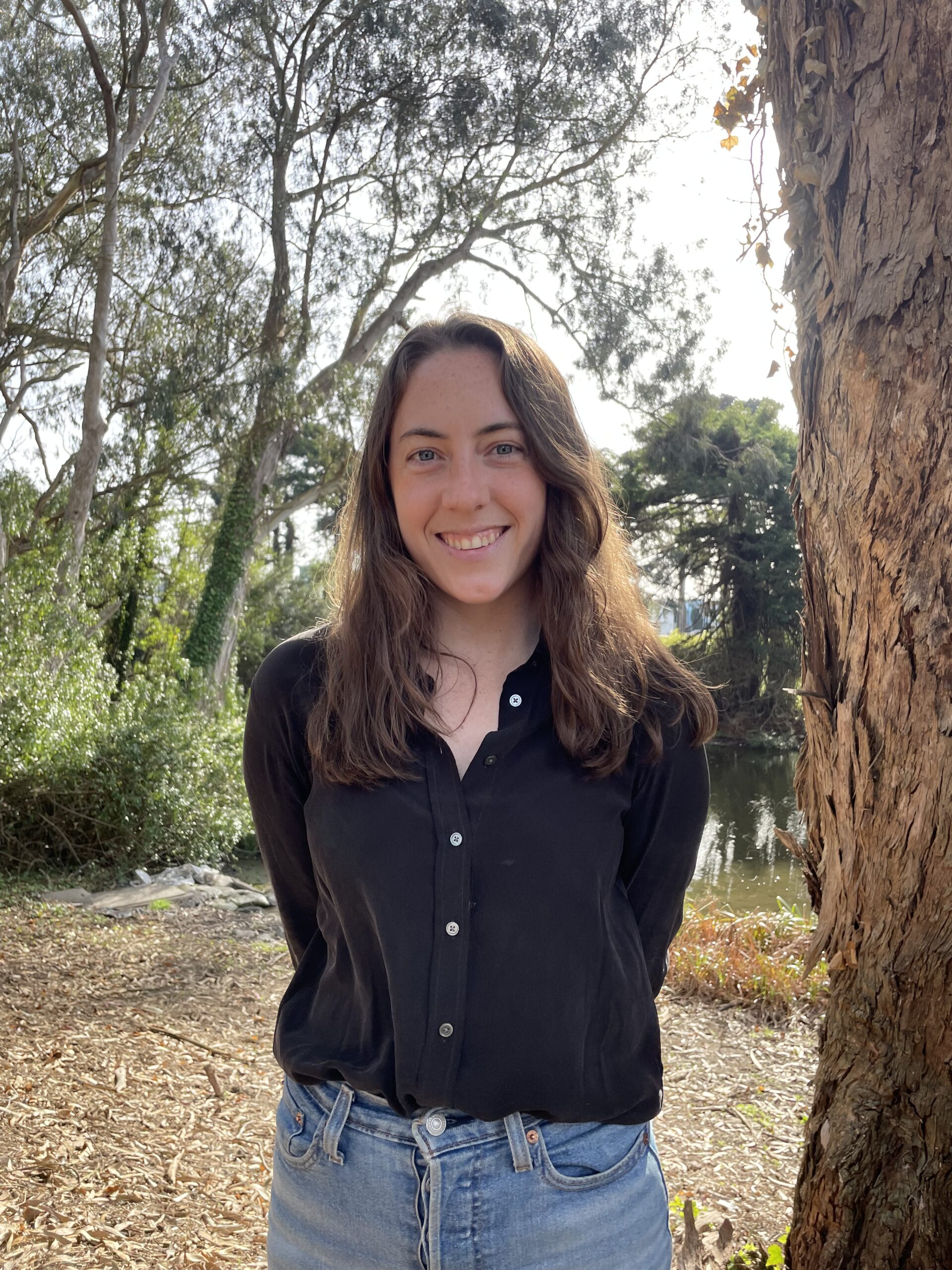 Lindsay Dougherty is a Speech & Language Pathologist with specializations in Autism and AAC. She currently works for the San Francisco Unified School District, providing direct services to students with complex communication needs and supporting her fellow SLPs on the AAC Support Team. Lindsay works on a team of professionals, implementing a Language Systems First curriculum for Pre-K and Kindergarten classrooms across the school district. The team provides a universal language system, staff and parent training, and AAC support to teachers and SLPs. She is also the faculty advisor of her middle school’s Best Buddies Club, where she supports students with disabilities in building meaningful friendships with peers.
Lindsay Dougherty is a Speech & Language Pathologist with specializations in Autism and AAC. She currently works for the San Francisco Unified School District, providing direct services to students with complex communication needs and supporting her fellow SLPs on the AAC Support Team. Lindsay works on a team of professionals, implementing a Language Systems First curriculum for Pre-K and Kindergarten classrooms across the school district. The team provides a universal language system, staff and parent training, and AAC support to teachers and SLPs. She is also the faculty advisor of her middle school’s Best Buddies Club, where she supports students with disabilities in building meaningful friendships with peers.
Our Featured Core Contributors for the month of June are Jadine Veluya, Christelle Marcelo, and Joseph Cachapero.
Filed under: Featured Posts
This post was written by Carole Zangari
